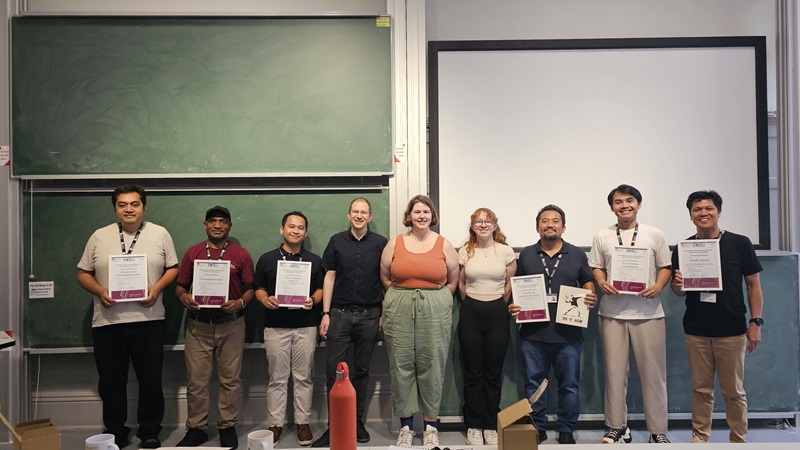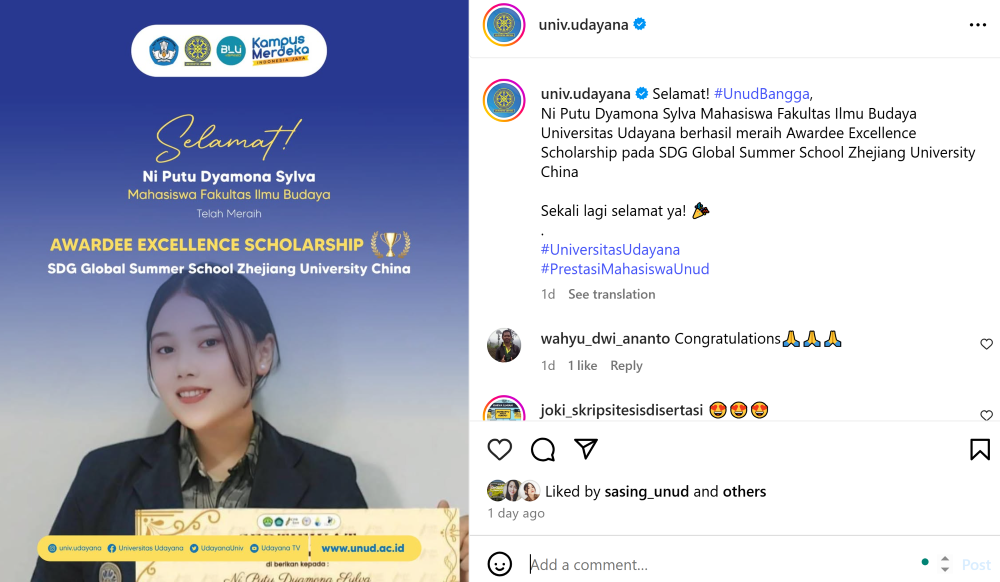Program Specification
| 1. Awarding Body/Institution | Udayana University |
| 2. Teaching Institution | Bachelor of English Literature, Faculty of Humanities Address : Jl. Pulau Nias 13, Denpasar, Bali, Indonesia Contact : Phone : +62 361 257415 |
| 3. Statutory Body of Accreditation | A by BAN-PT no. 3254/SK/BAN-PT/Akred/S/XII/2016 |
| 4. Name of the final award | Sarjana Sastra (S. S.) |
| 5. Name of Program | Bachelor of English Literature |
| 6. Language of Instruction | English and Indonesian |
| 7. Mode of Study | Conventional |
| 8. Mode of Operation | Public University |
| 9. Study Scheme | Full Time |
| 10. Study Duration | Minimum 4 years (8 Semesters) Maximum 7 years (14 Semesters) |
| 11. Admission criteria or requirements to the program | 1. Senior High School graduates or equivalent/same level 2. Passing one of the new student admission lanes. All announcements for the application process are available on the University webpage https://www.unud.ac.id |
| 12. Program Objectives | 1. producing qualified, dedicated, skilled graduates in English, with the following qualifications: (a) having excellence qualities in mastering English linguistic and literary aspects; (b) mastering basic skills in recognizing, understanding, and explaining issues related to language, especially English, and (c) mastering the basics of linguistic and literary research methodology, being open and responsive to the development of linguistics, literature, and culture and use it in social life. 2. producing graduates to occupy managerial or technical positions as: (a) research assistant, (b) language teachers, (c) administrators, (d) authors, (e) entrepreneurs, and (f) communicators. 3. enabling graduates to use English as a tool for earning and life-long learning, and craft policies and programs that would generate income. |
| 13. Program Learning Outcomes | The Bachelor of English Literature is committed to produce graduates with the three domains of desired characteristics including: (1) attitude: (a) to show religious attitudes and social sensitivity by upholding the value of humanity and respecting the diversity of cultures, religions, and beliefs, (b) to internalize academic values and demonstrate academic honesty, integrity, and professional ethics with the spirit of self-reliance, hard work, and entrepreneurship, (2) knowledge: (c) to explain basic concepts, methods, and theories of linguistics, literature, translation, and language teaching, and (3) skills: (d) to demonstrate proficiency in four English skills: listening, speaking, reading, and writing characterized by an achievement equivalent to CEFR level B2 (Upper-Intermediate English), that is the level in which the students feel comfortable in most situations, can interact spontaneously and with a degree of fluency with native speakers, and people can understand them without too much difficulty, and to communicate in English in a cross-cultural context, (e) to produce a scientific description of the results of study in the form of undergraduate thesis or final project report, (f) to apply appropriate theories and strategies for translating common texts, (g) to analyze various forms of learned literary works,
(h) to create a business plan or creative works independently using English knowledge and skills to provide English language services for specific purposes, (i) to identify, formulate, and solve problems in linguistics, literature, translation, and language learning in communication and other language/professional practices, and, (j) apply information technology to support English language learning, research, and services. |
| 14. Program Structure | The Program in English is 144 credits in total. The program structure consists of three categories which are general education courses provided by the University and Faculty of Humanities, specialized courses provided by the Bachelor of English Literature Program, and elective courses in which students can freely choose for 2-4 credits in total from the courses. |



FACULTY OF HUMANITIES